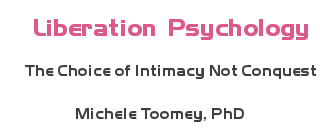Challenging Genderized Power: Defining Power As Energy Not Control
© 2000 Michele Toomey, PhD
When we think of why males are described as superior to females, we enumerate the ways men are stronger. The myth is that men are physically stronger, and mentally stronger than women, and, therefore, able to dominate and entitled to control them.
Women's sports and athletic achievements are considered less significant because when measured against men's records, women are not as fast, as strong, as interesting. When women began to integrate male professions, male colleges, and male jobs, there was a terrible outcry, frequent harassment and outright denial of female access. Why? Women were said to be intellectually inferior, physically inferior, and emotionally inferior, and morally weak. For years "scientific" proof was offered for intellectual and emotional inferiority. Smaller brains, emotional instability, and a source of sexual temptation and distraction to men made women dangerous and a source of lowering standards. Women needed protection and men needed to protect women, but they also needed protection from women. So, men were to protect women even as they were to protect themselves from women. A very complex love/hate, desire/fear relationship.
Even more complicated was the additional twist of each gender possessing what are described as female and male traits. Men who were in touch with their emotions had to struggle with fear of being weak and too feminine. Women who were in touch with their aggressive need to excel, had to struggle with fear of being too strong and too masculine. Sexual identity was tied to genderized power. To be normal, men must be strong and women must be weak. We may think this is an archaic belief system, but take a good look around. Take a good look at yourself, and how you define who you are and what you aspire to be. How do you relate to your own gender as contrasted to the opposite gender? Don't be surprised if male superiority linked to male strength and power is still very much alive, and female inferiority and lack of power is linked to the impetus for females to focus on beauty and seduction as the source of feminine power.
This measure of strength and power that establishes male superiority and female inferiority is irrelevant if we define power as energy, not as control. What right do we have to redefine power as energy in the inner world? Every right. It is a world of electrical signals carrying messages, it is not the world of brute strength. How tall we are, how much we weigh, how fast we can run, how much we can lift, do not determine the transmission of messages within our communication network. How we relate to these facts does. If we are stressed, our messages get transmitted differently than if we were comfortable and at ease. If we are excited and eager or sluggish and depressed, these feelings affect how we receive and transmit messages. In truth, physical strength and control are factors in our system, but they are not the essential elements.
Biology, biochemistry, neuroscience, physics, philosophy, theology, and psychology are all more essential to the self's communication network than physical strength and domination. Gender determines our orientation to receiving and sending messages, but it does not determine our facility or our capacity. The inner world of the self, therefore, has a communication system linked to the outer world, and it receives and sends messages both within itself and between itself and others. The brain acts as the control panel for this system, and the network is like the cosmos, in that "force" is energy, energy is power, and the intensity of the force determines its strength. Movement occurs as exercising of power, and when messages carrying ideas, images, thoughts, and feelings, are moving within the network, power is being exercised. When messages are sent to the body to move physically, power is being exercised.
In redefining power as energy, movement as the exercising of power, and intensity as force of energy, the hierarchy of genderized power is tipped over to an egalitarian relationship between paradoxical forces. Gender affects the orientation to these forces. Women first yield and move inward, then bring forth and move outward, while men first penetrate and move outward and then yield and move inward. Neither orientation is superior, and neither direction is superior. Both are equally legitimate, and both have their gifts and their limitations. Each gender must learn to complete the cycle and not stop at the initial movement. Women must not only yield and men must not only penetrate. The beauty of defining power as energy is that reconciling forces, not controlling forces, is the goal. Freedom then becomes the integrity of choosing how to reconcile our paradoxical forces, not how to dominate our inferior ones. The challenge is a puzzle not a test, a matter of conviction not of worth, an equalizer, not a destroyer. |



